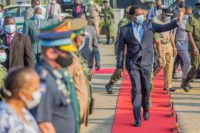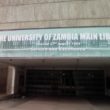Minister of Higher Education Dr Brian Mushimba says the government will not reintroduce meal allowances for students in universities.
And Dr Mushimba has called on public universities to live within their resource baskets than always relying on government to pay their bills.
Meanwhile, Dr Mushimba has warned politicians and those with sinister motives to fight their battles away from students in higher learning institutions or face the law.
Speaking when he featured on ZNBC’s Sunday Interview programme, Dr Mushimba said the government was, instead, looking at ways of increasing the number of loan beneficiaries to bring more vulnerable students on board.
“…meal allowances were removed largely because we have a limited resource envelope that government is giving to these institutions and we are having a situation where many more of our students are wanting to access the financial support that government gives and with the fees going up from the institutions, we are starting to see a situation where fewer students are being given these facilities. So how do you increase the envelope? How do you bring more students to access this if you are giving the few students everything, including meal allowances? So, the thinking was, let’s remove meal allowances so that we share this responsibility with the parents. TEVETA institutions that are doing very well; we don’t give meal allowances, but meanwhile, the students accessing TEVETA institutions are just as vulnerable, maybe even more vulnerable, but they have been able to enroll, they have been able to get trade skills to employ themselves,” Dr Mushimba said.
“We cannot reintroduce (meal allowances) unless we can find additional resources. The reason behind the removal was to make sure that we are able to stretch that envelope, we are able to add more students, and we are able to give more scholarships to more students. We cannot have a situation where just a few selected are enjoying everything at the expense of the other students that may also want.”
He further urged university students to realize that the support they were receiving from government was a privilege and not a right.
“What we have seen with our children is the movement away from looking at this as a privilege to looking at it as a right; ‘it’s my right that government has to educate me,’ and they almost feel entitled, but I am talking about only 20 per cent of our grade 12s accessing public universities and being given scholarships by government. So, you are privileged because 80 per cent are not getting this and this is the conversation we need to be speaking with our children so they can understand the vantage position they are in and then they can focus on just being educated versus doing all these other things that do not add value to their quest of seeking knowledge,” Dr Mushimba said.
And Dr Mushimba has called on public universities in the country to live within their resource basket and not always rely on government to sort out their bills.
“The funding mechanism that is being used to fund universities certainly needs to be looked at. Government has committed itself; we give a grant to the universities for them to operate, but usually, that’s not enough for them to meet all their costs, especially their wage bill. Their wage bills have been going up, allowances have been going up. We have asked universities to be prudent, to only pay what they can generate, what is available and restrict themselves in that basket. It has not happened…what we have asked the universities is for them to do a bit more in terms of meeting the government half-way. Where government stops, you take the ball and run with it,” Dr Mushimba said.
“These universities are well-placed to do a lot of work that can bring financial resources to themselves. They can do consultancies. Government is doing feasibility studies, many of these need technical expertise that is found in universities. We are encouraging them to compete if they need their hand to be held… they are intellectuals, they are brilliant, they can compete for this business and get it. UNZA has procured a state-of-the-art printing press, they can be printing examination papers if given a chance, and we need to make sure that we help them get those contracts to be printing certain things that right now are being printed outside the country.”
The minister also cautioned politicians against using students to fight their political battles and “leave innocent children out”.
“As politicians, we have our political battles; let’s take them on as politicians and leave our children out. We will pay attention to those politicians or people with sinister motives that are trying to prey on the vulnerability of our children and make sure that we address that through the security and the policing that is available,” Dr Mushimba warned.
And when asked whether he still stood by the decision to remove student unions in universities, he said his office was open to dialogue on the matter.
“We don’t go in offices to overrule what was done before; we go there to stand on the shoulders of what was done by those that served before us. We serve one government. Decisions that are made by one minister are binding to me, especially when they are well-explained and articulated the way this issue has been articulated. So, what we need to do is to just build and continue the dialogue that the Professor (Nkandu Luo) started around explaining what this is. And if, for any reason, the objective of what has been done here cannot be understood or appreciated and there is a huge push to go back to our traditional way of how student unions were being organized, who are we to stand in that position?” wondered Dr Mushimba.













2 Responses
Those of old once said, ” There is no fate except that which we create for ourselves.”
Dr Mishimba seems not to realise that his statement is campaigning against his party, the very” finger that feeds him.”
President Lungu has entrusted too much power into the hands of his ministers that they have become the ultimate authority in matters of making cjanges in their ministries. They are behaving like they were state governors in the USA or Nigeria.
We do campaign for PF but Dr Mishimba you are creating campaign luggage for us who go out to campaign for PF. You are actually saying GOODBYE to yet another crucial vote, the student vote and that of their parents and siblings.
Don’t threaten anyone. You are actually threatening your own self, your own party and your own job.
Bring sanity and fairness to institutions of higher learning, don’t start competing against them like your colleague before you did. Be real.